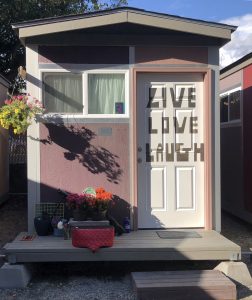
Portland, Oregon, Sep 13 (EFE).- Seattle’s Whittier Heights Tiny House Village is managed by the Low Income Housing Institute (LIHI) and is the city’s first sanctioned housing complex dedicated to helping homeless women reinsert themselves into society.
Whittier Heights is ensconced between a bank parking lot and an apartment complex and is a zone impossible to access without permission.
LIHI social worker Sherry Sternhagen told EFE that the staff seek to find homeless women long-term housing “but it’s complicated” since they are “more focused on how to help these women obtain an ID card, a Social Security Number or to register in local food programs.”
Financed with public and private donations and constructed on public land, the community, surrounded by steel fences with secure access gates, is the first of its kind exclusively for women.
Up to 21 women over age 16 can be housed there at a time, and each can stay for a maximum of two years.
The aim of the center, which was inaugurated on July 10, is for the women to remain there for just eight months and, within that time, to help them rejoin society.
“They are women with a lot of trauma, who come from extreme violence, with sexual abuse, and so the (therapy) sessions are very emotional.” Sternhagen said.
Single women, couples and elderly women live at the center, and some of them have brought their pets, too.
A psychiatrist and a doctor visit the women once a month thanks to the help of a team working with homeless people in Seattle and comprised of social workers and police.
The 15 small houses in the community are 2.5 meters wide by 3.6 long (8.2 x 11.8 feet), are valued at $2,500 each and have been built by teams of female carpenters and volunteers and decorated and painted by local artists.
In each, there is room for a bed and storage, and they all have heating, electricity and a door with a lock.
Altogether, the houses are contained in an area of 30 square meters (323 sq. ft.), with common tables in the center, and in the common areas there is a complete kitchen and bathroom. It is only in the common areas that the residents can receive visitors.
“We offer them treatment to detoxify themselves, (along with) clothing and hygiene items,” said Sternhagen.
LIHI personnel are on call 24 hours a day to keep the place clean, safe and organized.
King County, which includes Seattle, has about 11,600 homeless people, of which 35 percent are women, according to state data from 2018.
About 1,000 people are served by the 250 small houses in zones like Whittier Heights that LIHI oversees in Seattle.
